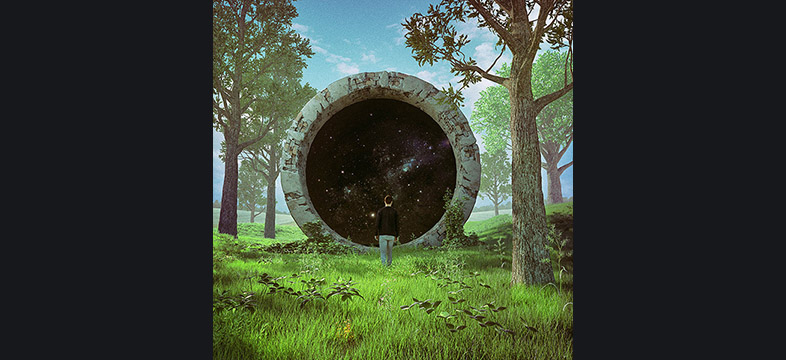∴

[ “Mass-Effect Template Overlay #1: VR Bliss and Abundance” ]
…
Key Points:
- Aside from suppressing free speech on major social platforms, Big Tech companies will keep building surveillance tools that violate human rights until there are better protections for conscientious objectors and whistleblowers who stand up to them
- Computer code geared for low-resistance totalitarianism: opting out isn’t an option, and privacy is no longer protected by being careful about what you disclose online
- Regulatory standoffs and the nuclear-threat analogy: if the state doesn’t step in on antitrust or other violations, the last inhibitor is a sort-of mutually assured mental degradation via mind-remapping and the hazardous consumerist joys of self-wiretapping (through smartphones, speakers, vehicles, etc.)
- The role of self-determination within the involuntary digital framework
- How to thread the distraction economy’s chaotic mental obstacle course
- Leaders and followers alike need to make objective, critical assessments about how they partner with all of this
- We all play a role in the destructive patterns in this world; our job is to do our best to make the world better at all times
. . . … . . .
New-Look Tech Dogma
You already know today’s internet is addictive—built to monopolize our attention and monetize what it learns about us. What most people don’t perceive is the mental remap emanating from an advanced cognitive attraction/repulsion mechanism, one with an unavoidable grip on modern life. By using the internet and related software, complicity dulls our senses while etiquette prevents us from recalling how friends and relatives who were previously sane have adopted (and been coopted by) “digital behavior” that in any other era would be considered obsessive, intrusive and, by several measures, strange. But because they can use this software at their impulse a salty kind of situational despair, voyeurism and absurdity has been enabled, not to mention the heightened class consciousness that grows everywhere in the virtual world. The availability of a digital tool has changed us into something capable of alarming neediness. In the vapor space we’re constantly reminded about what we missed, what we lack, and what we cannot control or afford. It takes steady discipline to combat conformity as the latest tools entice pole-vaulting over social norms—certain individuals go from being a friend to being a spy (“information is power,” asterisk* removed), and they believe their right to know has superseded your right to privacy.
This isn’t the story of a single friend or relative tugged out of alignment; it’s the story of how the internet changes us. We want more information—often information to which we’re not actually entitled. We grow to need more—more answers, more numbers, and more approval. It becomes a hedonistic proclivity. We’re pushed to ask and seek, until we’ve feverishly crossed a dozen boundaries of propriety and common sense.
If you’re one of his 1+ billion “most active users,” you tell Mark Zuckerberg how you’re feeling, what you’re thinking, what you’re eating. He knows who you’re having sex with and may have seen you naked. He likes your eyes and will fold them into his inescapable facial recognition technology. He understands your value and he knows your worth, down to the penny. Isn’t it nice to have a friend you can trust as much as him? Your best friend Mark collects and aggregates user information and shares it with state and federal authorities, as well as security organizations from other countries. He collaborates with government security agencies on massive citizen surveillance programs such as PRISM. He censors and removes user accounts based on unknown criteria and at the request of third parties including government and foreign government agencies. Your buddy Mark’s business model allows governments and businesses alike to use its algorithmically conjured advertising categories as sophisticated data-mining and surveillance tools. His news feeds are censored and crafted to reflect the political leanings of Facebook’s utopian socialists while remaining vulnerable to misinformation campaigns designed to stir up violence and prejudice. As a matter of business and principle, Mark enables weak intellectual property protections on your behalf and is slow to close down IP theft accounts. And finally, his lovely platform has been subject to the largest security breaches of user data in history.
So what happens if you don’t applaud the received dogma and reinforcement of our new-age capitalist culture? Understand that the lens through which you view the carefully controlled social media is actually a system where everyone is evaluated primarily in terms of the race and gender they possess and that this myopic view is necessarily stifling, hypocritical and intellectually bankrupt. Dismissing it only strengthens the argument. We’ve been told to downplay it for the betterment of society while the digital media corporations promote and amplify identity politics, victimization and polarization. You can continue to wonder if this is just us being us, that the internet as a shell, itself, is harmless. Children, on the other hand, aren’t even aware of how harmful this is because it’s marketed as comfort and cohesion. In their formative years, kids are programmed to mirror us and the things we’ve built. They were given a powerful tool that strikes at that evolutionary tinge of envy in all of us, and takes them away from human interaction. They are being groomed to work for free in the information and surveillance economy, and they’re being taught how not to complain about its arrival.
The data sold behind your back to entrepreneurs (on your time) and government agencies (on your dime) widens into exploitation and echoes shades of Marxism, but has morphed from “profit generated by the exploitation of workers” to “rent appropriated by the privatization of the general intellect,” as Slavoj Žižek argues. Bill Gates, Mark Zuckerberg and Twitter’s Jack Dorsey, for example, now own and control a new form of general intellect. Jeff Bezos, meanwhile, ensures that no thinking person will ever name their baby Alexa again. Like Marx, their form of contemporary capitalism revolves around a fundamental problem they spend all day (every day) resolving, the problem of consolidating the commons in all its dimensions—nature, culture and the universal space of humanity from which no one should be excluded.
As the article “Exit Facebook” warned three years ago (see autumn 2016 edition, below): The social media cabal Zuck and other digital elites belong to are controlling free speech and identity at scale. Steady streams of scandals, resignations, platform overhauls and public lamentation have spilled forth since then: Facebook has effectively stifled other news publishers; allowed Cambridge Analytica and others to secretly acquire data on at least 50 million users (then sold into influence peddling for election politics); missed the 2016 Russian connection entirely; and confounded a curious-but-feckless Congress with weak testimony that was tactically propelled by intentionally vague word play.
Now Facebook seeks to create a hyped “privacy-focused” future for the platform—which based on its sheer capabilities, record profits and Zuck’s past corporate behavior, is a ploy designed to stem a user exodus. He fears that, and he also fears US antitrust regulation, federal privacy crackdowns and the European regulators who had enough willpower to swing axes well ahead of anything America’s done about it.
We as a country lead in the technology push, and lag on the blowback. And for Facebook, an algorithm run primarily on politics, crime and tragedy (against a field of a dozen tracked tonal metrics) should be having a negative effect on the world’s biggest social network, because those are the three major inputs the Facebook code protects.
First-world society now asks: Have smartphones destroyed a generation? Because the allure of independence and privacy, so powerful to earlier generations, holds less sway over today’s youth. And as rates of teen depression and suicide have skyrocketed since 2011, it’s no exaggeration to describe iGen as being on the brink of the worst mental-health crisis in decades, if not ever. Much of this deterioration can be traced to their phones.
The image that Facebook and other social media promoted for years—an idealistic enterprise more dedicated to “bringing the world closer together” than increasing its bottom line—was always a carefully constructed smoke screen.
Welcome to Surveillance Capitalism. A system that shows up in your life so often and so extensively that you become numb, forgetting that this is not a wild dystopian imagining of the future… it’s the present, and its leaders have revealed themselves to be exactly what they are: as ruthless and profit-seeking as any Gilded Age tycoon. Instead of mining the natural landscape, surveillance capitalists extract their raw material from human experience. They shape-shift, but each shape manifests the same aim: hunt and capture raw material.
You are data exhaust. The surveillance milieu of present-day capitalism provides plenty of human-commodity inputs to work with; it does so precisely because they built it. We are the source of what technologists call “information exhaust”—the informational byproducts of our every connected movement and decision. Why are surveillance capitalists vacuuming it up from every corner of our lives? Because it furnishes a startlingly accurate picture of human behavior. Behavior modification is a numbers game, and the prediction algorithms the Big Tech masters of the universe employ are endlessly hungry for your data.
You know that old and oft-repeated saying that if the service is free, the product is you? Turns out not to be true in the new digital age—no, instead, you’re not even the product, just an abandoned carcass from which the mental ivory (behavior, preferences, etc.) has been excised.
…

[ “Born to be Downloaded + Reformatted” ]
…
Origin of Cause, Diagnosis, Awakening and Escape
The first step in avoiding a worst-case scenario is realizing we, as an information society, had an intense and hasty experimental journey into techno-immersion over the past two decades. Essentially it’s still a trip worth taking (we strongly desire useful information), at least for those who can adapt to poignant lessons in failure, boundaries, the hustler’s intent, signal-to-noise, online decoy identities and Marshall McLuhan’s prescient theories playing out all around us in zeros and ones.
The ideal of the digital world revolves around a constant striving for perfection, maximal speed of transmission, immediate availability, high quality data, durability of information and cleanness of transfer (i.e., eliminating any interference and the creation of “perfect” communication). Today, we know this utopic dream cannot be fulfilled. Now we can study what the socio-digital simulacra might pack into its next version of a humanity hologram, infected behavioral codes and all. A portion of this innovative system is generating turbo without us, brakes off…
The exchange of information never takes place directly. This is why we are constantly doomed to face distortions sown by the media and social media mega-corporations. Information transforms and deforms as it is passed around. This is why the faddish rejoinder of analog culture—that humanist backlash—could be perceived as the revival of the materiality so detested in the digital era: DIY culture, opting out of social media, and the mindful resignation of perfection that comes with it.
There is a quasi-revolt—basically a new hybrid aesthetic—stemming from the experience of mingling analog and digital traditions that keeps up with modern practical matters but remains deeply interested in the defeat, defect, damage and failures in the project of digitalization. Its adherents are reborn from the digital ashes, and are oft regarded as glitches in the template. It’s not like they can completely disappear from the dominant digital paradigm, but instead hack out little harbors and hideaways from being watched 24-7.
If you are a heavy smartphone or internet user, then you already know the origins of a syndrome, because your symptoms are typical to the millions of people who’ve crossed the invisible line into problem territory. You find yourself incapable of reading books, watching full-length movies or having long, uninterrupted conversations with three-dimensional human beings in real life. Social media has made this cohort anxious and angry… even the digital spaces they once found soothing (group Reddit conversations, podcasts, YouTube k-holes) aren’t helping anymore.
You’ll try various tricks to curb your usage, but will always relapse. It is then that you will know, without any shadow of a doubt, that corporations are dicking around in the inner recesses of your mind!
Psychologically speaking, even if you were an early adopter from the 1970s or 80s, the simian manipulative drive embedded in today’s technology predates us by decades if not centuries, as does its use in business. Naïve idealists might disagree with this, but most of us can plainly see the biological projection and extension of humankind in it. We cannot make this happen, and then claim to be the victim of something we no longer understand, without an acrid duplicity foaming up at the back of our throats; the simple truth being that we did it all for convenience and possible longevity.
Out of a sense of guilt, denial or a disdain for complex logic, the nation’s early-adopters, industry insiders and technology pundits prefer a lofty stance to scold the digital heretics: “Hush now, you never had any privacy anyway so get over it, or go live under a rock if you don’t like it.” This attitude, which they blithely impose on others, was planted by the corporations, who gather as much intelligence as the government agencies they’re comingled with. All doing backstrokes in the foul marketing stench of proselytized tech journalists scavenging for their next paychecks.
The shift began in the final 30 years of the nineteenth century—the start of a great struggle between corporations and civil society as state-run antitrust legislation, which was widely in place at the time, began to dissolve. The turning point was the American Civil War. Corporations made huge profits from procurement contracts and took advantage of the disorder and corruption of the times to buy legislatures, judges, maybe even presidents. President Abraham Lincoln foresaw the trouble associated with a corporation that attempts to prolong its rein by working on the prejudices of the people until the wealth is aggregated in a few hands. The republic is destroyed but such a maneuver, and those who vie to dub its procession “progress” or “digression” can descend in civil madness together. If he were alive today, Lincoln would display little sympathy for those who seek consolidation of power through the unprecedented architecture of an intrusive algorithm, unleashed by the likes of Bezos, Zuck and Gates. In the current age, some attrition of the ceaseless corporate willpower would prevent a negative feedback loop as people stop living on “alphanumeric dead time” and attempt to mitigate, block or escape from the digital panopticon and those who run it.
You can argue that interloping is the inherent right of a private company in the capitalist system, and you’d be correct in the essence. It’s easy and satisfying to say “Tough shit, that’s just the way it is” and surely this is also true to the letter. But in pursuit of that blurry technocratic dream, there is a story of a democracy derailed, a revolutionary spirit repressed, and a once-proud people reduced to servitude.
…

[ “Paralyzed in the Hall of Data Pylons and Tractor Beams” ]
…
Media Morality and Nuclear Bombs (Parallel)
The use of intrusive, pervasive technology lends itself to paranoid fantasies of a civil apocalypse, or at least suggests there’s no survival for certain former parts of the human psyche in the digital future. Others would say this view lacks a sense of proportion. The techno-optimist says it’s an unhelpful perspective if not a dangerous myth, because people get very philosophical about it. Worse, they begin to believe there’s nothing they can do, and begin to panic or disassociate from the issue. That sense of futility actually demotivates people for preparing for any type of disaster (not just the mental ones foisted upon us by surveillance capitalism), and I believe preparing for it is very important.
When separating the good things technology does from the shady, on the low side we’re stranded with the allegorical cousin of nuclear bombs (war tool) and fallout (consequences)—both of which grew out of a previously-unfathomable technology. There’s this notion that the entire United States would be devastated by nuclear fallout after getting bombed, and it’s wrong; experts know the vast majority of us would survive the initial blast and the radioactive plume. Also, let’s say Russia did it; it would be impossible for Russia to use every single nuclear weapon it has. At any given time, some nuclear weapons and their delivery systems are down for maintenance or repair. Also, some won’t be in a position to fire, much less be used, if they’re going to save some for any potential future conflicts. These facts, however, are not enough of a dissuader for the average American, because we hate the idea that even one bomb drops, and are mortified beyond belief when shown footage of Hiroshima and Nagasaki.
Similar to the way we perceive extreme, dictatorial concepts about surveillance, no one on any continent would like nuclear war, because it always brings talk of irradiated population centers and mutually assured destruction, which during the Cold War 1950s was appropriately abbreviated to M.A.D. We knew then, as we do now, that if we were to bomb Russia or China, they would bomb us. Although many people would be left, those who might survive in a semi-lawless realm will devolve into a form of feral mental illness once the thin veneer of “civil society” breaks apart. These days there is a concept that your mind can also be bombed into compliance by the computer’s efficient delivery of false ideas and manipulations, which also fragments society.
After WWII, we built up a massive nuclear arsenal in competition with the Soviet Union, which went on for years until the Chinese, British, French and Israelis ultimately joined the movement. We ended up with a peak arsenal of 60,000 nuclear warheads across the globe. Metaphorically, this is also where digital surveillance and capitalism are headed if it remains unbridled… a state of overkill that makes sci-fi into circumstance.
What we need now are de-escalation pacts and cease-fires from tech and social media giants. Back in the real world, through several treaties over the years, we’ve reduced the size of the world’s nuclear arsenal to about 16,000. That’s still many more times than is needed to destroy the world.
Just as we still haven’t seen the definitive progress needed to change the risk that’s been associated with these large nuclear arsenals, we have not seen the right magnitude of course-correction by the digital elites to fend off M.A.D. in the “virtual commons” if it rises to DEFCON level 1. They are still marketing it to us as something that will and must “make your lives better”—thumb-UP only, in a world without choice.
Legendary chitchat about an unrealized nuclear holocaust bases itself on hypotheticals, while the digital war has already arisen and gone hot; its potency lies in how it went nearly unnoticed. And as we’ve seen with nukes developed by aerospace and defense contractors, you can count on Big Tech’s developers to get better at making their weapons smaller, less detectable and more sophisticated at an accelerating clip as machine-learning force multipliers take hold.
Does their payload end up in your headspace? It all depends how you choose to orbit or select a path through the digital simulacrum from here on out. Will you choose deep inconvenience and social detachment over the warmth of compliance, conformity and surveillance? Will you make a stand Matrix-like, proverbially ingesting the red or blue pill? It will come down to that, most experts in the field agree, and even more so as the currency system moves away from cash transactions.
In the realm beyond weapons designers, physicists and the miraculous arrow of fission, there is an intracranial war that the supposedly-impartial outside mediator—core internet and social platforms—has weaponized. And though it’s more complicated than it used to be, there are still myriad ways to get ourselves away from technology and back into the dominion of balance. The toughest and most daunting part? Adjusting our collective mindset to view unplugging, escape and selectivity as a reward—a reward strong enough to overwhelm FOMO and other major areas of inductive stress internet users experience while online.
It just takes a few good and powerful people—skeptical, unimpressed and capable of nuanced, thoughtful digital austerity measures—to say “We. Don’t. Need. Everything. From them.” And put the brakes on the digital cravings that sweep us up into an inescapable, Orwellian network-effect endgame of privacy invasion and surveillance capitalism—all while telling us this is a perfectly good and rich life.
Regulation, the threat of regulation, and the capping of “lobbying interests” (as measured in influence and/or dollars) would go a long way toward maintaining a healthy separation between the corporate-driven public world and the private ones we’ve innately needed since the dawn of humanity. The state must step in once again, just as we saw in the age of Lincoln, and help us reset the balance.
…

[ “Night-Minded and Blinded by the Light” ]
…
The Casual Barbarism of a Distraction Economy
For much of Western history, laws, regulations, Christianity and other rules-based ways of living have restrained the human tendency toward barbarism. But as Thomas Paine and others pointed out, God died in or about the 19th century, and so religious dogma and discipline began to die with him. That gave us the age of ideology, the age of fascism and communism—and with it, the gulag and furtive reeducations in concentration camps. Since then we’ve tried another way to pacify the masses. Since most conflict is over values, we’ve decided to not have any values. We’ll celebrate relativism and tolerance. We deny the true nature of humanity and unpretentiously pretend everyone is nice. The upside is we haven’t blown ourselves up; the downside is we live in a world of normlessness, meaninglessness and chaos. And this is not a defense of Christianity or religions, not by a long shot—anyone with a basic understanding of history knows the role religion has played in fostering fear, intolerance, wars, murder of innocents, and the like.
The digital-age tendency toward civil barbarism doesn’t look like the Old Testament style. It appears in carefully-mediated reaction formations and subtle politically-correct narrative strictures, all of which is camouflaged by a contagious form of digital narcissism. If you’re like most of the millions of digitally-addicted Americans, you’ll do what a lot of people do in an argument these days. Instead of actually listening to what someone’s saying (because they offended your orthodoxy), you’ll just distort, simplify and restate their views to make them appear offensive and cartoonish. To which a quick-witted and willful debater could calmly and comprehensibly correct and rebut you. But it doesn’t matter to you, does it? Now you no longer have to pay attention or be curious. A lack of reasoning and zero tolerance for criticism are masquerading as strength in a new format. Mission accomplished. Add up a high enough number or frequency of these blatantly ego-driven communicative misfires and the natural order of civil society begins to falter. Studies show the internet absolutely drives this kind of breakdown in real-world experiences.
All of life is perched on the point between order and chaos. Chaos is the realm without norms and rules. Now, with Facebook, Twitter and other social platforms we can see how overtly narrow norms and rules can create a special form of chaos while promoting the green optimism of progressive ideology. If your instinct is to whine, to play the victim, to seek vengeance, then you will struggle and find pain. I recommend never doing that, but rising above the entire culture of internet-fueled victimization we see all around us. We must conduct our lives in a manner that requires the rejection of immediate gratification, of natural and perverse desires alike. Instead, choose discipline, courage and self-sacrifice. Then post it on YouTube, of course.
This advice sounds to many like vague exhortatory banality. Like the oeuvres of Hobbes and Nietzsche before me, and in noticing these things through careful research and consideration, do I imagine an overly brutal universe, nearly without benevolence, beauty, attachment and love? Alas, it is true that my recipe for self-improvement—from within the stark confine of a digital simulacrum—is solitary, nonrelational and unemotional. But this topic is but a few threads within life’s rich tapestry, let’s not forget. Grain of salt.
…

[ “Behind the Veil, the Void” ]
…
Conclusion: Death by Dragonfly
InstaSnapYourFaceReaper—along with Alphabet and plenty of government agencies—likes a nice snout full of data exhaust. Its infrastructure tendrils run deep and combine with thousands of other, smaller social media enterprises (including all job and dating websites) and e-commerce, making us unable to opt out of the mainstream web environment we unassumingly describe as a “clear net.” Meanwhile there’s a “dark web” where opt-outers keep a distance and where the black market’s ersatz GDP gains Bitcoin-tweaked momentum each year. What if the label’s reversed: who’s actually seeing it clearer? In the age of mental highway robbery and Orwellian doublespeak bordering on the farcical, why not just be a criminal? Who jested? Who digressed?
Those operating the social controls, tolls and roadblocks ask users if they can access their contacts, so they can scrape your phone number and email addresses from friends even if you stay off their apps. That opens the doors to lots of private information. They infer a wide range of things about you just by studying your web browsing behavior—your moods, your political and religious beliefs, your sexual orientation, your health, all of it. Profiles created through web analyses and your cell phone—information every phone company is now selling widely—reveal your movements and will tell everyone that you’ve been to a cancer clinic, gun shop and a bar—and that you visited the apartment of someone who isn’t your spouse. Without regulation, you can expect them to know more and more about you no matter how discreet you think you are. In a word, the entire relationship is “vampiric” in nature.
A few senior engineers at Google (Alphabet) have resigned over ethical concerns about Project Dragonfly, the effort to modify all web searches to meet the censorship and surveillance demands of the Chinese Communist Party. Between the public shaming from ex-employees and outcries from the company’s “privacy team,” Google has temporarily halted Dragonfly, but only long enough to update their terms and policies while spending millions lobbying to limit employees’ legal rights.
A quantum level, Dragonfly-like system will be implemented in the United States and other Western countries if Google gets its way; in fact, its foundation has already been built. Google is racing to do so before the loopholes potentially close—it knows the time has passed when tech giants can simply build tools, write algorithms, and amass data without regard to who uses the technology and for what purpose.
I believe what was researched, analyzed and rendered above was derived from a state of objective detachment. On the most subjective and sincere level, however, the ghost of good intentions arose over my shoulder to say “I care more about you than Facebook and Google, and probably don’t even know you at all.”

[ “Choice Void Situation” ]